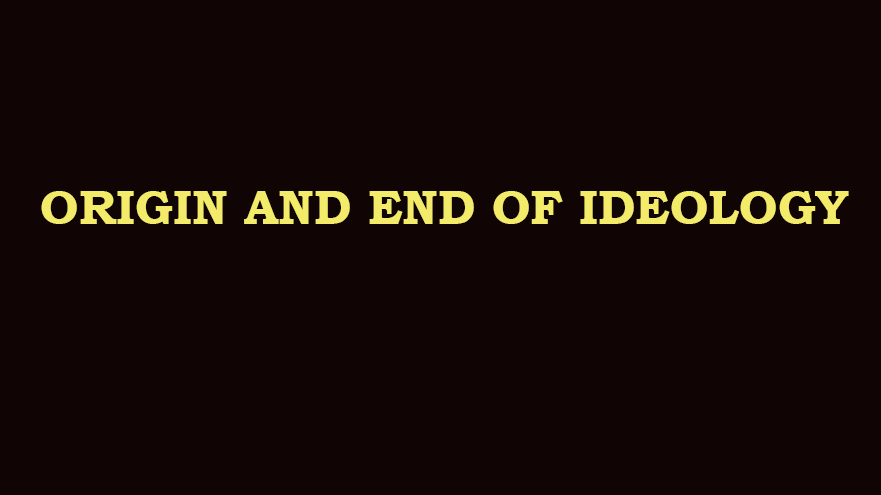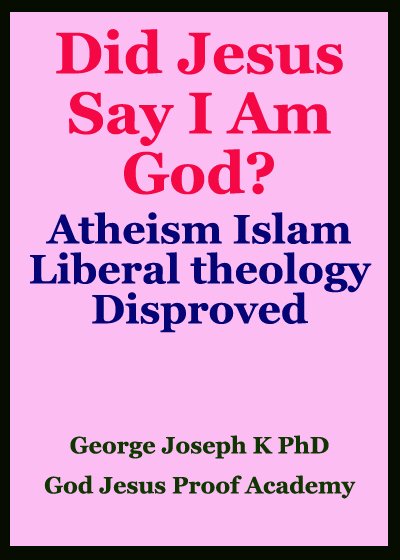
ORIGIN AND END OF IDEOLOGY
With the disintegration of medieval society, a systematic study of the intellectual legitimation of social domination was initiated. Thus, when intellectuals adopted a scientific approach to knowledge and attempted to acquire precise and unbiased information, the feudal political system and the theological view of the world were brought under severe criticism. This tradition of critique of religion and political system served as a background for Destutt de Tracy’s introduction of the term ideology (For a discussion about the extent to which the critique of feudal political system and religion of N. Machiavelli, F. Bacon, T. Hobbes, Helvetius and Holbach ideas was to establish a sound theory of moral and contributed towards the origin of ideology, see J. Larrain. Op. cit. PP. 17- 26; See also D. McLellan.op. cit. P. 4ff.).
The word ‘ideology’ has its origin in France in 1976. Destutt de Tracy was the first to use the word ‘ideology’. Tracy introduced the word ‘ideology’ in a lecture on April 21, 1796. In 1796 ‘ideology’ possessed no political content. It was just a ‘science of ideas’ as it literally meant. For Tracy the purpose of ‘science of political sciences ‘eliminating metaphysical and religious prejudices. Thus, initially ideology was a means for discovering truth and dissolving illusions. The method Tracy and his followers used for this was ‘analysis’. Analysis was an intellectual process of deliberate, systematic reduction of every idea pertaining to every phenomenon into its simplest, irreducible elements followed by a synthesis of those elements, (R.H. Cox, Ideology, Politics and Political Theory. California: Wadsworth Publishing Company Inc., 1969. pp.10-11; See also W.A. Mullins. Op. cit. P. 499). They considered science as the result of this two-way process.
Through originally the term ideology had a positive connotation, gradually it began to assume a pejorative meaning and thus the original meaning began to recede. The main reason for this was the real tension between the ideal politics and the actual politics. The ideologue’s ideals of free thought, free press, individual liberties, the integrity of representative assemblies and secularization differed from Napoleon’s empire of forced conformity. Napoleon hated the independent spirit of the ideologists and started ridiculing ideology as ‘metaphysical revery’, ‘visionary moonshine’ and ‘idealistic trash’ (E. Kennedy. “Ideology from Desutt de Tracy to Marx”, Journal of the History of Ideas, Vol. XL. No.3. (July- September 1979). P. 358; J.W. Steim. Beginnings of Ideology”, South America Quarterly, 55. (1956). P.168) Napoleon’s classic denunciation of ideology occurred after his defeat in the Russian campaign. On December 20, 1812 he declared that, “It is to ideology, that obscure metaphysics, which searching after first causes, wishes to found upon them the legislation of nations, instead of adapting the laws to the knowledge of human heart, and to the lessons of history, that we are to attribute all the calamities that our beloved France has experienced” (John Adams, The life and Works of John Adams, Boston: Charles C. Little and James Brown 1857. Vol. 6, pp.401-402). Here, it must be noticed that Tracy had reportedly said in July, 1802 that ideology, “Would change the face of the earth, and that is exactly why those who wish the world to always remain stupid… detest ideology and the ideologues” (E. Kennedy. Op. cit. PP. 357- 358).
But through Napoleon’s contemptuous usage, “Ideologue” and “Ideologie” became derogatory word and outside the circles of Tracy they had a connotation of law estimation. Thus, the technical core of the original concept gradually receded. (A. Naess et al. Democracy, Ideology and objectivity: Studies in the semantics and Cognitive Analysis of Ideological Controversy. Oslo: Oslo University Press, (1956). P. 151; For more detailed discussion on the history of the origin of ideology see G. Lichtheim “The concept of Ideology”. History and Theory. Vol. IV.No.2 (1965). pp.164-195; J.S. Roucek “A History of the concept of ideology” Journal of the History of Ideas. 5 (October 1944). PP. 479- 488; M. Seligar. The Marxist conception of Ideology: A Critical Essay. Cambridge: Cambridge University Press, 1977. PP. 15-19).
END OF IDEOLOGY
A group of people could become motivated, mobilized and oriented towards certain deliberate actions only if they are, generally dissatisfied with their existing conditions of life and speculate scope for some kind of an improvement in the society. An actor or the people as a whole can realize the need for an improvement in the existing conditions only if they perceive the situation and evaluate it in the light of their historical experience and expectations. The way an actor perceives a given situation depends on the nature of the actor. The actor has its prepossessions and predispositions determined by its historical experience, culture, values, beliefs and expectations. These prepossessions and predispositions of the actor which constitute its very essence and identity might be called the historical consciousness of the actor. It refers to all the attributes and awareness that the actor possesses in relation to its past, present and future. An actor’s perception of a given situation is determined by its historical consciousness. It is through the prism of the historical consciousness that the actor perceives a given situation. Hence that the actor gets as a result of its perception of given situation is its “image” of the situation rather than the “objective reality” (if my) of the situation. The actor’s evaluation of its image of the situation generates certain interests for the actor. Hence the actor formulates precise goals and objectives, the attainment of which could fulfill its interests. Thus, the actor orients itself to certain actions which, according to it, are efficacious enough to attain its objectives in the given situation. Action follows from the action orientation of the actor.
Thus, an ideology comes into existence as a result of a social process. Here the actor perceives a given situation in and through the prism of its historical consciousness and generates not only an image of the situation but also certain interest, the fulfillment for of which could be considered as essential for its well-being and security. Hence in order to attain its objectives and fulfill its interests, the actor orients itself towards certain courses of actions in that particular situation. Action result from its action orientation of the actor. Thus, the major aspects or stages in the process of the evolution of an ideology, as emerging the analysis of ideology, are historical consciousness, perception of the situation, action orientation and action. A detailed explication of the interrelationship among the various aspects of ideology is necessary.
THE ‘END OF IDEOLOGY’ THESIS
In the mid- 1950’s there was a debate on the ‘End of Ideology’ thesis. The ‘End’ or ‘decline’ of ideology was used in that context to refer to the elimination of fascism and less conclusively of communism as viable option in a democratic society, the general decline in intellectual and public discussion of broad ideological alternatives, political theories, far- reaching goals, and utopias, and the narrowing of the political distance in term of policies and programs between the major parties in democratic societies and the weakening of the correlation between socio-economic class and voting behavior. The exponents of the end of ideology originally intended it to refer only to the situation existing at that time. They were taking note of recession of the titanic attempts in Europe to extend the ideologies of fascism and communism entire societies, the diminution of the belief among of the belief among Western intellectuals that such extensions were enduringly possible or desirable and the inverse correlation between the degree of economic development and the intensity of ideology in a given society. The reason for all the controversy about the end of ideology was that, whereas it was an ‘empirical thesis’, critics of the thesis treated it as if it pertained to questions belonging to the realm of political philosophy, that ideologies could never again exist (S.P. Huntington, American politics: The Promise of Disharmony, Cambridge: The Belknap Press of Harvard University Press, 1981. P.171; Shils “The Concept and Function of Ideology” In International Encyclopedia of the Social Science. Edited by D.L. Sills. New York: The MacMillan Company & The Free Press, 1968, Vol. VIII P.75; See also D. Bell. The End of Ideology – on the Exhaustion of Political Ideas in the Fifties, New York: Free Press, 1960; W. Carlsnaes. 1981. op.cit. P.237). But as long as there is a discrepancy between the ‘ideal’ or aspirations of the society and the actual social situations, a strong impetus for ideologies would exist. As Althusser opines, “Human societies secrete ideology as the very element and atmosphere indispensable to their historical respiration and life. Only an ideology world outlook could have imagined societies without ideology and accepted the utopian idea of a world in which ideology… would disappear…” (L. Althusser, For Marx, London.: New Left Books, 1977. P. 232).
Thus, it becomes obvious that the end of ideology in politics is not yet in sight (For details on the ‘End of Ideology’ thesis see M. Rajai (ed) Decline of Ideology. Chicago: Aldine Atherton, 1971; C.I Waxman (ed). The End of Ideology Debate. New York: Simon and Schuster, 1968; L.N. Moskvichov. The End of Ideology Theory: Illusions and Reality. Moscow: Progress Publishers, 1974).



